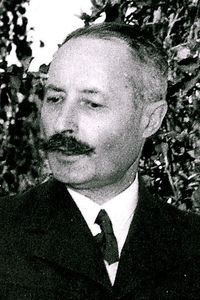Henri Honoré Giraud, a distinguished French military officer and politician, entered this world on January 18, 1879, in the 13th arrondissement of Paris, a city renowned for its rich cultural heritage and iconic landmarks.
He spent his formative years in this vibrant metropolis, surrounded by the grandeur of the Eiffel Tower, the Louvre Museum, and the charming streets of Montmartre, all of which undoubtedly played a significant role in shaping his future endeavors.
Giraud's life was marked by a series of notable events, including his military career, which saw him rise through the ranks to become a prominent figure in the French military establishment.
He played a crucial role in shaping the course of French history, leaving an indelible mark on the nation's political landscape.
Giraud's legacy extends far beyond the confines of his military accomplishments, as he also made significant contributions to the world of politics.
Despite his many achievements, Giraud's life was not without its challenges, and he faced numerous obstacles along the way.
Ultimately, Henri Honoré Giraud's life was one of dedication, perseverance, and a commitment to serving his country, leaving behind a lasting impact that continues to be felt to this day.
He breathed his last on March 11, 1949, in Dijon, Côte-d'Or, a city known for its stunning cathedral and rich cultural heritage.
Noted military leader, Giraud, embarked on a distinguished career that spanned multiple conflicts, including the tumultuous First World War, the Rif War, and the devastating World War II. Throughout his illustrious tenure, he rose through the ranks to achieve the esteemed position of general of brigade, a title he held from 1930 onwards.
As the tumultuous landscape of World War II unfolded, General Henri Giraud emerged as a pivotal figure in the intricate web of events that ultimately led to the liberation of France from the shackles of Nazi occupation. With unwavering conviction, he championed the notion of reinvigorating the fight against the formidable forces of Nazi Germany, steadfastly refusing to align himself with the Free France movement.
Instead, he garnered the crucial backing of the American forces, who recognized his unyielding commitment to the Allied cause. This pivotal decision would ultimately prove to be a turning point in the war, as Giraud's unwavering resolve and strategic prowess played a significant role in the eventual triumph of the Allies over the Nazi regime.
The extraordinary events that transpired in November 1942, marked by the Allied forces' momentous landing in French North Africa, ultimately led to a significant shift in the political landscape of the region. Following this pivotal event, Admiral Darlan's untimely demise paved the way for General Giraud to assume power in French North Africa, initially holding the esteemed position of High Commissioner of France for Africa, and subsequently taking on the supreme command of French civil and military forces.
As the commander of the Army of Africa, he wielded significant military authority, overseeing the troops as they battled alongside the Allies against the German and Italian forces. Furthermore, his influence extended beyond the military sphere, as he was also patron and inspiration to various factions within the internal Resistance movement.
General Henri Giraud, a prominent French military figure, initially adhered to the Vichy regime's laws in North Africa, however, his stance underwent a significant shift following a persuasive encounter with the influential economist Jean Monnet, who successfully convinced Giraud to irreversibly sever ties with Marshal Philippe Pétain, a key figure in the Vichy government.
As the Allies intensified their efforts to bring about unity among the French resistance, they urged Giraud and General Charles de Gaulle to put aside their differences and collaborate. In response, the two generals agreed to co-lead the French Committee of National Liberation (CFLN),a joint governing body, from June to November 1943, marking a pivotal moment in the French Resistance's fight against the German occupation.
As the Allied forces continued to wage war against the Axis powers, a complex web of events unfolded that would ultimately lead to the downfall of Giraud, a prominent military leader. Despite his initial successes and strategic prowess, Giraud's relationship with Charles de Gaulle, the iconic French leader, began to fray. De Gaulle, driven by a desire to consolidate his own power and influence, began to subtly undermine Giraud's authority, gradually eroding his role within the Allied forces.












